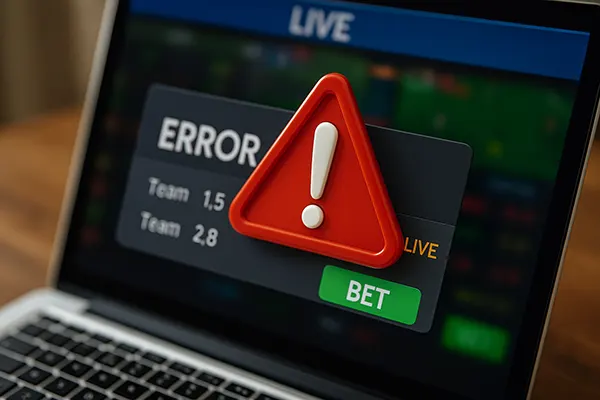
Biggest Bookmaker Errors in Recent Years: When Players Won Through Bugs
Betting systems are designed to be precise, calculated, and difficult to outsmart. Yet, even the most sophisticated platforms are not immune to critical bugs and live miscalculations. Over the past decade, several high-profile blunders have cost bookmakers millions while opening unexpected doors for savvy or lucky punters. Below is a deep dive into some of the most notable cases, legal reactions, and expert opinions surrounding fairness and technical integrity in the betting industry.
Real Cases of Odds Glitches and Live Failures
In 2021, a Swedish player exploited a decimal error on a live tennis match where odds meant to be 1.08 were mistakenly published as 108.00. The player placed the maximum bet allowed and cashed out before the glitch was fixed. The bookmaker suspended withdrawals, but following pressure from gambling regulators, the full amount was paid.
A similar incident occurred in the UK in 2023 during a Premier League match. One operator incorrectly listed both teams to score in the second half at 15.00 odds — a tenfold inflation. Dozens of bets were placed within minutes. Though the company tried to void the wagers, the Advertising Standards Authority ruled against them, citing insufficient consumer protection practices.
In Denmark, during a 2022 handball tournament, a local betting firm allowed real-time bets to be placed up to five minutes after goals were scored due to a server delay. Several bettors noticed the lag and repeatedly capitalised on it. The bookmaker later acknowledged the fault but only reimbursed original stakes — sparking legal complaints still under review in early 2025.
Consequences of Technical Oversights
Bookmakers often include clauses in their terms allowing them to cancel bets affected by “obvious errors.” However, regulators have increasingly scrutinised these practices, especially when companies appear negligent. In Sweden, courts have ruled in favour of customers where the operator failed to promptly correct known odds bugs.
UK authorities, including the Gambling Commission, have reiterated that fairness must outweigh internal risk protection clauses. In multiple 2022 decisions, they forced bookmakers to honour winnings resulting from technical malfunctions if the odds remained live for more than a few minutes without correction.
In Denmark, the legal system is still evaluating a landmark 2023 case where a tech glitch caused mispriced odds on greyhound racing. The national ombudsman stated that if operators fail to meet reasonable tech quality standards, players should not bear the consequences. A final verdict is expected mid-2025.
Scandals and Legal Disputes in Europe
Scandals involving mispriced bets have hit numerous European markets. In Sweden, Unibet was fined in 2022 after failing to disclose a live betting delay affecting basketball events. Investigations revealed they were aware of the bug for 11 days before it was patched.
The UK saw a public backlash in 2023 after a major bookmaker refused to pay £250,000 in winnings, blaming a “software inversion” that listed underdogs as heavy favourites. The player took the case to court and won — marking a significant shift in precedent. Industry commentators noted this as a wake-up call for the entire sector.
In Denmark, a regulatory audit of small-scale operators in 2024 uncovered multiple instances of incorrect live markets, often due to manual odds-setting without sufficient oversight. Several firms have since adopted automated systems to prevent similar issues, though concerns about transparency remain.
How Operators Are Responding
Bookmakers have responded by investing in more robust backend monitoring tools and faster odds recalculation mechanisms. Companies like Bet365 and LeoVegas now rely heavily on AI-driven live data systems to flag anomalies in real-time and halt suspicious markets within seconds.
Many firms are also rewriting customer terms, tightening error definitions while introducing automated limits for volatile bets. However, critics argue this may unfairly shift all liability to users without guaranteeing platform reliability.
In response to recent cases, Danish and British regulators are working on harmonised EU-wide rules regarding odds mispricing, due to be proposed in Q4 2025. These may include mandatory reporting of technical incidents and stricter payout rules under defined delay thresholds.

Expert Views on Fairness and System Integrity
Experts agree that betting integrity must evolve alongside technology. Dr. Emma Karlsson, a gambling compliance analyst from Lund University, says: “A fair system is one where users can rely on the published odds without fearing post-bet cancellations unless fraud is evident.”
British lawyer Alan Westfield adds: “Operators have a duty of care. When bets are accepted and confirmed, only gross and obvious discrepancies should trigger reversals. The grey area is shrinking, especially as regulators step in.”
From a player’s perspective, transparency is key. Several advocacy groups are pushing for open access to odds change logs and a right to challenge rejected bets through third-party mediation. As of early 2025, this remains a debated topic across legal forums.
The Future of Betting Accountability
Legal frameworks are slowly adapting to cover modern betting intricacies. While many glitches were once hidden behind ambiguous policies, growing consumer awareness is shifting the balance. Real-time error tracking and open communication are now considered baseline expectations.
International cooperation between regulatory bodies may define the next evolution. Countries like Sweden and the UK are leading discussions on unified gambling transparency laws, potentially changing how bookmakers operate across borders.
Ultimately, as systems grow more complex, accountability must remain a central principle. The industry’s credibility depends not just on avoiding mistakes — but on how fairly and promptly they are handled.
The most popular articles
-
 The NBA star has become a problem for his team
The NBA star has become a problem for his teamDuring the 22/23 season, many, including the entire team, waited …
-
 A Beginner’s Guide to Betting on Tennis: Strategies and Tips
A Beginner’s Guide to Betting on Tennis: Strategies and TipsTennis, with its rhythmic back-and-forth action, offers more than just …
-
 Top transfer news
Top transfer newsStay updated with the summer transfer window as we bring …
-
 ComeOn bookmaker: payout checks and withdrawal speed — what really ...
ComeOn bookmaker: payout checks and withdrawal speed — what really ...When a ComeOn withdrawal feels “slow”, the delay is rarely …
